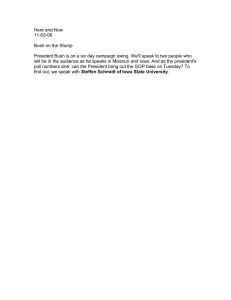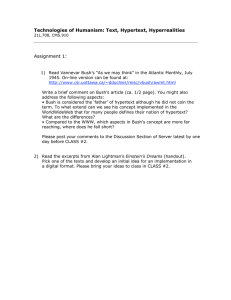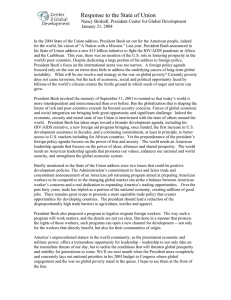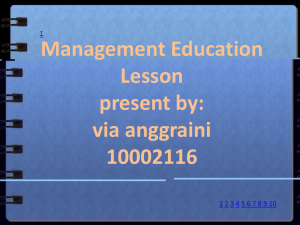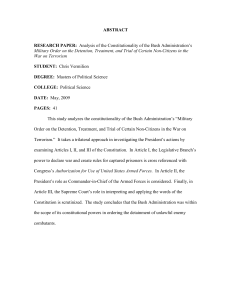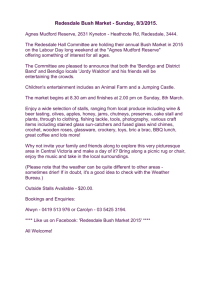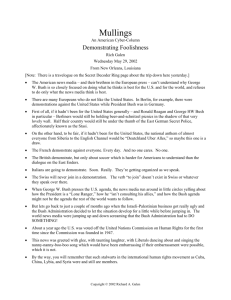““““The Bush Administration The Bush Administration The Bush Administration’’’’s Asia Policy
advertisement
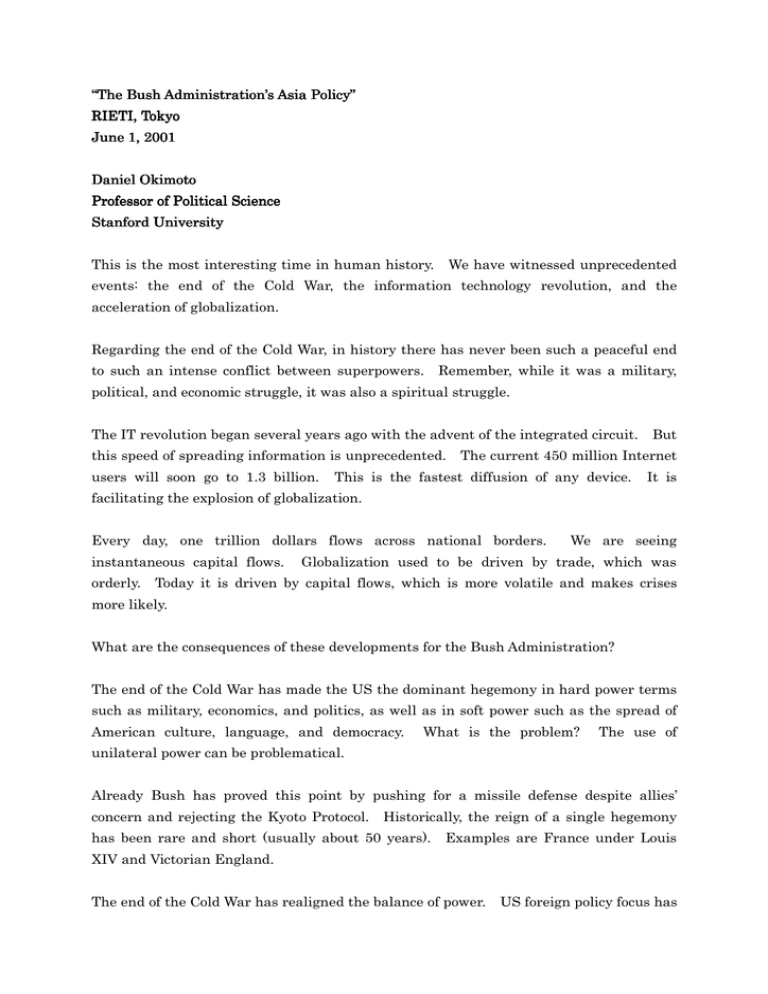
“The Bush Administration Administration’’s Asia Policy” Policy” RIETI, Tokyo June 1, 2001 Daniel Okimoto Professor of Political Science Stanford University This is the most interesting time in human history. We have witnessed unprecedented events: the end of the Cold War, the information technology revolution, and the acceleration of globalization. Regarding the end of the Cold War, in history there has never been such a peaceful end to such an intense conflict between superpowers. Remember, while it was a military, political, and economic struggle, it was also a spiritual struggle. The IT revolution began several years ago with the advent of the integrated circuit. But this speed of spreading information is unprecedented. users will soon go to 1.3 billion. The current 450 million Internet This is the fastest diffusion of any device. It is facilitating the explosion of globalization. Every day, one trillion dollars flows across national borders. instantaneous capital flows. We are seeing Globalization used to be driven by trade, which was orderly. Today it is driven by capital flows, which is more volatile and makes crises more likely. What are the consequences of these developments for the Bush Administration? The end of the Cold War has made the US the dominant hegemony in hard power terms such as military, economics, and politics, as well as in soft power such as the spread of American culture, language, and democracy. What is the problem? The use of unilateral power can be problematical. Already Bush has proved this point by pushing for a missile defense despite allies’ concern and rejecting the Kyoto Protocol. Historically, the reign of a single hegemony has been rare and short (usually about 50 years). Examples are France under Louis XIV and Victorian England. The end of the Cold War has realigned the balance of power. US foreign policy focus has been concentrated on the implosion of the USSR, the expansion of NATO, and the management of the fragmentation of Yugoslavia. Policy on Asia had been on cruise control. The IR revolution and globalization have increased economic growth but has also increased economic volatility. The international financial institutions such as the IMF are not equipped to handle this volatility and there has been no restructuring of international regimes. Moreover the gap between the rich and poor has widened since the industrial revolution and will continue to widen with the increased flow of capital. The global system cannot remain stable with such disparity. Meanwhile, there has been a decline in the power of the nation-state. Holes in national safety nets are growing. The state has fewer tools. Fiscal, monetary policy, etc. are limited in their effectiveness. On to Bush and Asia: Mr. Bush was elected as a minority president and now faces a Democratic Senate. He is a novice at foreign policy, but has assembled a tough, seasoned, bright team of veteran advisers. It is unclear still that is most the powerful in the team, but Dick Cheney and Donald Rumsfeld are hawks and Colin Powell is a relative dove. They are veterans of the Cold War and Desert Storm. There is also a remarkable amount of versatility among his team; one could imagine some of the advisors trading positions. Finally, they wish to ensure US preeminence and power. I can list six principles that guide this team: 1. Shore up US military power. Andrew Marshall recommends the military develop quick, nimble weapons. 2. Don’t be afraid to use power and don’t be intimidated by rogues (North Korea and Iraq). 3. Be selective in the use of US force. 4. Consolidate alliances—especially with NATO and Japan. 5. Be strong against rivals. This means tough love to China (the biggest challenger). US-Japan-China triangle is essential. 6. Expect an adjustment in Asia over the next ten to twenty years, as changes in the system take effect. There have been some hard realities for this Administration: the Ehime Maru accident, the spy plane crash in Hainan, and Kim Dae Jung’s visit to Washington, where Bush and Kim differed on Korea’s “sunshine policy” and the KEDO program with North Korea. China joining the WTO, which is positive, will raise conflicts with US corporations. In conclusion, it is a heady time. Trends have opened the chance for peace, but new dangers and threats are possible. Bush’s early problems in Asia appear to be a sign of what is to come. Question & Answer Q: I was astonished by your view that Bush will make Asia the center of his foreign policy. Why do you say Asia is the most dangerous region? Is the US frustrated with Japan’ Japan’s economy? The Middle East is a problem, but it has always been a focus of American foreign policy. US national interests are growing in Asia. The US-Japan alliance is no longer a given. Will Japan react if conflict breaks out in Asia? Q: A focus focus on security can invite a security dilemma. Is this a danger? Do you see a new Cold War? Missile defense was signaled during the campaign and is not up for debate. think it was a good decision. I think the US should continue R&D and keep its possibilities open. Missile defense negates China’s nuclear capability. difficult to destroy missiles in flight. deterrence equation in Asia. But I don’t And it is very A theater missile defense would change the Would the US share the technology with Taiwan? Bush is pleased with Koizumi’s popularity, but there is a split of opinion on the reform proposals: One camp says that reform in necessary in Japan to put the economy back on a growth trajectory. The other camp, which includes Paul Krugman, says that reform will make the recession worse. It is good that Bush did not browbeat Japan. There is a dulled sensitivity to Japan’s economic woes in the US Congress. Q: Will Bush be flexible on the role of international organizations? Bush has surrounded himself with advisors who believe in market mechanism solutions. They will be committed to universal standards. George Shultz was a huge critic of the IMF; he said it encouraged moral hazard. Q: Can you elaborate on the US approach toward China? Clinton saw engagement with China as desirable to encourage economic development. Bush agrees. As countries get richer, they become democratic; this is a trend in history without exception. They hope that as China becomes richer, it will become more democratic and less militant, not just more powerful. Q: How can we deal with China’ China’s nationalism? I give Bush good marks in dealing with the spy plane incident. Over several days, the Chinese pilot kept coming closer and closer to the plane and Bush had protested. China’s demands for a US apology were inappropriate. The US and China negotiated behind the scenes to release the hostages. nations. The whole thing has left scars on both Chinese leaders may cling to nationalism as a way to unify the country. Q: Do you have have advice on JapanJapan-China relations? I hope relations improve. A Japan-Korea type of reconciliation is unlikely between Japan and China. Q: Economic development is precious to the Chinese, so one may conclude that China will have to cooperate with the US to ensure economic success. China’s growth is heavily domestic demand-driven, so they are a bit less dependent on trade. Q: Will the Cleveland biotechnology theft become an issue in USUS-Japan relations? relations? The politics are different this time compared with the IBM case. You should discount the media’s interpretation. Q: What are the prospects for launching a new WTO round? What about a USUS-Japan FTA? There was US support for your Japan-Singapore pact efforts. such an agreement as opening possibilities in Asia. Bush would like to see A US-Japan FTA would be difficult to negotiate. Anne Krueger of Stanford will be handling WTO issues for the Council of Economic Advisors. She is staunchly pro free trade, but not pro regionalism. Q: How influential is Andrew Andrew Marshall? He is highly respected. Messrs. Cheney and Rumsfeld have high respect for him. He will do a long-term re-assessment of the military’s capability. Q: What will US policy toward India be? The US sees India as becoming more powerful and US-India relations should be close. The economic relationship is potentially very fruitful. There is an opportunity for economic interdependence. -The RIETI editorial department is responsible for this article.
